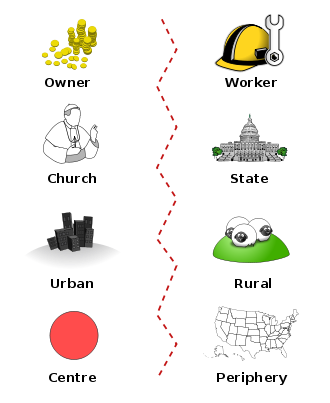- Cleavage (politics)
-
Cleavage in political science is a concept used in voting analysis and is the division of voters into voting blocs.
The preliminary assumption is that voters don’t come in predefined groups of pros and cons for or against a certain subject. Ballot analysis assumes that voters opt for a certain party, or decide for the solution or option that comes closest to their own position. Cleavage separates the voters into advocates and adversaries on a certain issue, or voting for a certain party. If you imagine parties on a horizontal line for a certain issue, cleavage is the vertical line that divides the parties into supporters and opponents of the issue.
Examples
There are probably as many cleavages in society as diverse members, but Seymour Martin Lipset and Stein Rokkan (1967) defined four basic cleavages for western civilization after the Industrial Revolution. According to Lipset and Rokkan, these cleavages determined the emergence and the content of all European parties.
- Centre – Periphery - The division between elites in the urban areas, and those in more outlying areas. This usually expresses itself in terms of regional nationalism. For example, in Spain many regions have regionalist or separatist parties. This division is, according to Lipset and Rokkan, caused by the creation of modern nation-states, where some states were better than others at assimilating other cultures into the majority nation.
- State – Church - A division between religious and secular voters. In the Netherlands until the 1970s there were five major parties: the Catholic People's Party (KVP), the Protestant Anti Revolutionary Party (ARP) and Christian Historical Union (CHU), the social democratic Dutch Labour Party (PvdA), and the liberal People's Party for Freedom and Democracy (VVD), the last two being secular.
- Owner – Worker - A class cleavage, causing the formation of parties of the left and parties of the right. Sometimes it is argued that this cleavage represents a conflict between the rich and poor.[1] Various parties have claimed to represent either interest, though this may or may not be genuine.
- Land – Industry - Continued state exercise of control over Tariffs against freedom of control for industrial enterprise.
Contemporary ballot analysis speaks of the emergence of new cleavages. The traditional opposition between Owner and Worker (Capital and Work) is being differentiated further among those who have work/ are employable and those who are not. Further, sex becomes another cleavage, especially in regard to getting and maintaining a paid labour position.See also
Further information
- Seymour Martin Lipset and Stein Rokkan (May 6, 1999). "Das "Konfliktlinienmodell einer Gesellschaft" (in German). Berlin, Germany: Andreas Hahn. http://www.aillyacum.de/Dt/Wahlen-Deutschland/Wahlforschung/Wahlforschungsmodelle.html#_Toc450320345.
- Amie Kreppel (Jan 29, 2002). "Cleavages". http://web.clas.ufl.edu/users/kreppel/cleavages.pdf.
- Seymour Martin Lipset and Stein Rokkan. "Cleavage Structures, Party Systems, and Voter Alignments". http://janda.org/c24/Readings/Lipset&Rokkan/Lipset&Rokkan.htm.
- ^ Gallagher, M., Laver, M., Mair, P. (2006), Representative government in modern Europe. New York: McGraw-Hill, p. 268-269.
Categories:
Wikimedia Foundation. 2010.

